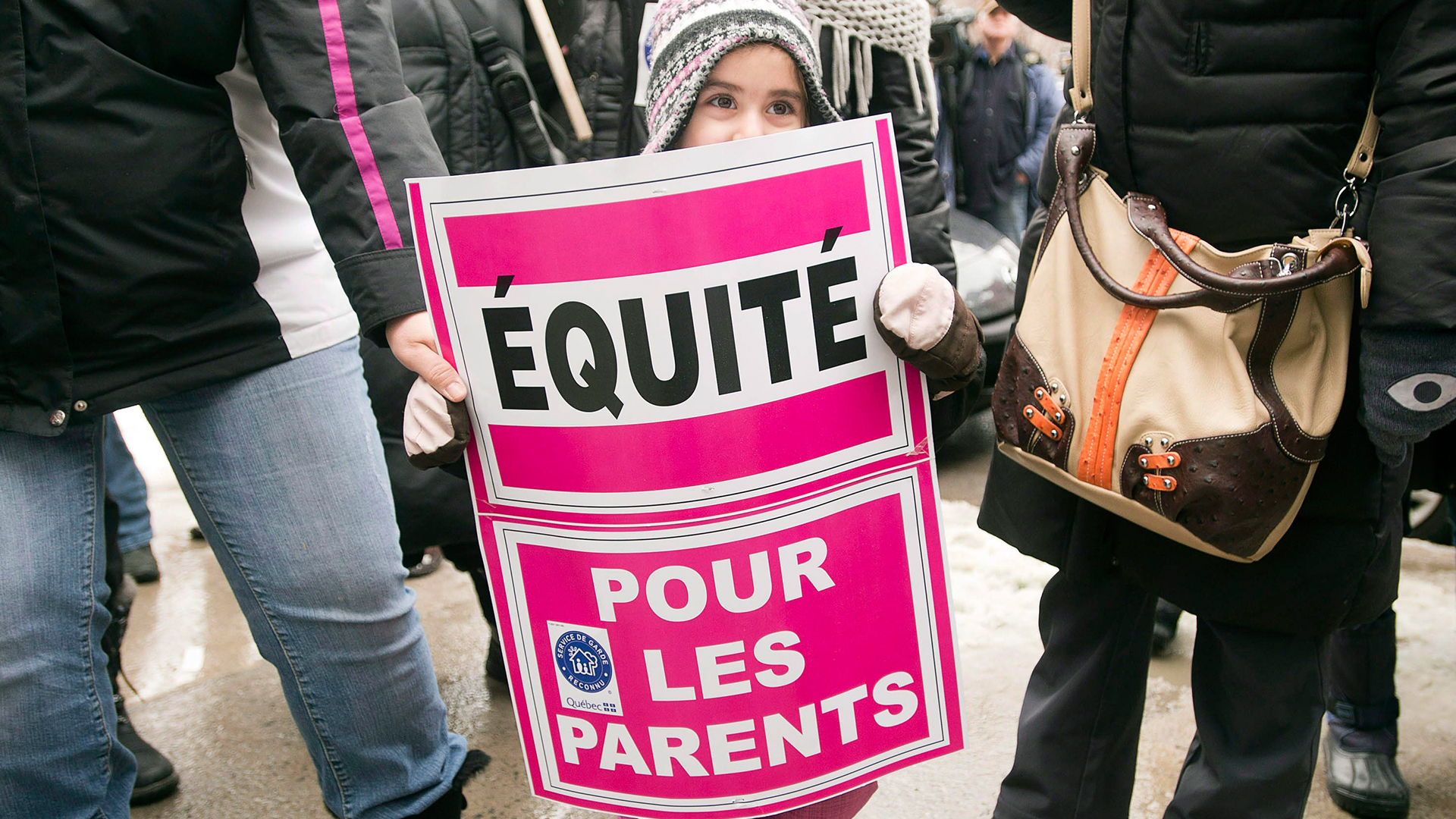
(Version française disponible ici)
In their Brève histoire de la Révolution tranquille, historians Martin Pâquet and Stéphane Savard place the end of that period in Quebec’s history in February 1983, when a harsh back-to-work law broke a cycle of mobilization and reform that had begun in 1959. The 1980s were indeed a difficult period, socially speaking.
But the transformation of Quebec society did not really stop there. One can even think that another revolution, also a quiet one, was taking off. In 1976, less than a third (28.7 per cent) of Quebec families with at least one child under 16 years of age had two incomes; forty years later, in 2015, this was the case for almost three out of four families (73.2 per cent). In 1976, the employment rate for women of young childbearing age (25-44) was 44.5 percent; by 2022, it had risen to 84.8 percent, one of the highest rates in the world. The lives of couples, the functioning of families, the labour market and the entire social organization of Quebec had been transformed.
An American quiet revolution
These trends were obviously not unique to Quebec. But they can certainly be seen as a revolution. Indeed, the American economist Claudia Goldin speaks of a “quiet revolution” to describe the massive entry of women into the labour market and its repercussions for couples and families from the 1970s onwards, in the United States as in other rich countries.
Many women were previously employed, especially since the 1960s. But these jobs were primarily held only until marriage, or were secondary sources of income for families, often on a temporary or part-time basis. In short, mothers had “jobs” rather than careers.
With the rise and regularization of women’s employment, social norms changed and more and more women saw employment as a permanent situation, in fact linked to their identity. Young women started studying longer to get good jobs. At the turn of the millennium, Quebec women became more likely to have a university degree than men, and the gap continued to widen thereafter.
In both Europe and North America, this shift toward employment and education has contributed powerfully to gender equality, household equality and collective wealth. But, as the Danish sociologist Gøsta Esping-Andersen noted a few years ago, the revolution remained incomplete. On the one hand, women’s employment rates and incomes everywhere remain lower than those of men. On the other hand, the public policies needed to make cash transfers and public services compatible with this new reality have not always followed.
New families, new policies
The new standard of the two-income household has increased the risk of poverty for single-parent families, which have themselves become more numerous. In Quebec, almost 30 per cent of families with at least one child at home were single parents in 2021. If poverty is measured relatively, as it is with the low-income measure that sets the poverty line at 50 per cent or 60 per cent of median income, the effect is obvious: one-income households are more likely to remain below that threshold. The risks associated with unemployment are also obviously greater for families with one income.
In a recent study, Swedish sociologist Rense Nieuwenhuis establishes a statistical link between the prevalence of two-income households and the risk of poverty for single-parent families. But this is not inevitable. Countries that provide good child care and generous social transfers to families are more successful in addressing the poverty of single-parent families.
In this respect, Quebec is doing relatively well. A new publication from the chair in taxation and public finance at the University of Sherbrooke takes stock of 25 years of family policies and concludes that Quebec society is still supporting families. With less expensive child care services and more generous financial transfers (including good parental leave), Quebec remains the Canadian province with the best support to families, whether they have one or two parents.
After taxes, transfers and childcare costs, a single-parent Quebec family with one child and a gross income equivalent to 67 per cent of the average wage would find itself in 2021 with a disposable income 0.6 per cent better than its gross income. Elsewhere, this disposable income was instead lower than gross income (one per cent lower in France, 4.4 per cent in Canada, 13.1 per cent in Sweden and 16.2 per cent in the United States). For families, Quebec remains today one of the most generous places in the world. It would be even more so if all families had access to good subsidized child care.
However, the risk of poverty remains higher for children growing up with only one parent. In Quebec in 2019, according to the market basket measure, the poverty rate for these children was 20.7 per cent, compared to 4.8 per cent for children living with couples. But in Ontario, those same rates were 30.4 per cent and 8.7 per cent, respectively.
An incomplete revolution
So we have come a long way since the second quiet revolution began. Like the previous one, this new revolution remains incomplete and its gains appear fragile. Even Sweden has experienced setbacks in the wake of the austerity policies of the 1990s and 2000s, which were particularly hard on single-parent families. But, as three European sociologists, Elise Aerts, Ive Marx and Zachary Parolin, recently noted, we know how to make the most of this feminist quiet revolution. It takes good child care, adequate labour market regulations (including a high minimum wage), and generous transfers that are based on universalist foundations, with a pinch of selectivity to favour the most vulnerable.
It has been 25 years since Quebec adopted an ambitious, pioneering and feminist family policy, and it has worked. The remaining task is to consolidate and improve these achievements.








